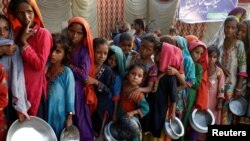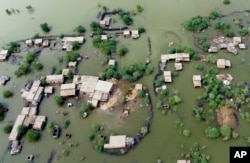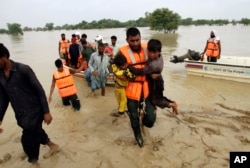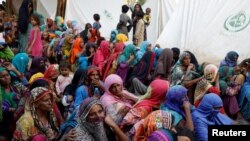Pakistan and the United Nations are holding a conference in Geneva Monday to mobilize support for a resilient recovery of Pakistan from last year’s climate-induced catastrophic floods.
Organizers say delegates from 40 nations, including several heads of state, representatives of international financial institutions and development organizations, will attend the International Conference on Climate-Resilient Pakistan.
Pakistani Prime Minister Shehbaz Sharif will co-host the event with U.N. Secretary-General Antonio Guterres as they seek an estimated $16.3 billion to rehabilitate and rebuild damaged infrastructure in a climate-resilient manner.
“Millions of Pakistanis affected by unprecedented devastation look for compassion and solidarity to build back better,” Sharif said in a statement Sunday before leaving for Geneva.
“We will place [a] comprehensive post-disaster framework plan for recovery, rehabilitation and reconstruction with resilience before development partners and friendly countries,” he said. “Bridging funding gap is key to restore critical infrastructure, rebuild lives and livelihoods and revive economy.”
The U.N. says that the 2022 flooding, caused by record-breaking monsoon rainfall, was Pakistan’s worst disaster in decades, leaving one-third of the country submerged, affecting 33 million people, killing at least 1,700 and displacing 8 million.
The ensuing floods rendered more than 2 million people homeless, wiped out crops and destroyed or damaged vital infrastructure, including thousands of kilometers of roads and railway.
Guterres visited Pakistan’s flood-hit regions in September and described the destruction as “climate carnage.”
U.N. Development Program Resident Representative in Pakistan Knut Ostby said in advance of Monday’s conference the disaster was caused by accelerating climate change across the world.
Most of the waters have now receded but an internationally backed post-disaster study estimates that $16.3 billion is needed to help the country’s rehabilitation and reconstruction over the long term.
Pakistani and U.N. officials say several million children are still living near contaminated and stagnant flood waters, putting their survival and well-being at risk.
“We estimate that up to around nine million people - additional people - could be pushed into poverty due to the flood impact,” Ostby said. He stressed that Pakistan’s flood crisis is a global problem and must be addressed as such, warning the disaster can happen to other countries affected by climate change.
Ostby noted that crops had been lost from the last harvest and from the missed planting season.
“Agricultural prices - food prices - are therefore increasing and could push, double the amount of people into food insecurity, increasing that number from seven to 14.6 million.”
Sharif’s government says the catastrophic flooding has added to the economic challenges facing Pakistan. The country of about 220 million people has struggled to pay for imports such as energy and food amid rapidly dwindling foreign exchange reserves, making it difficult for Islamabad to meet foreign debt obligations.







